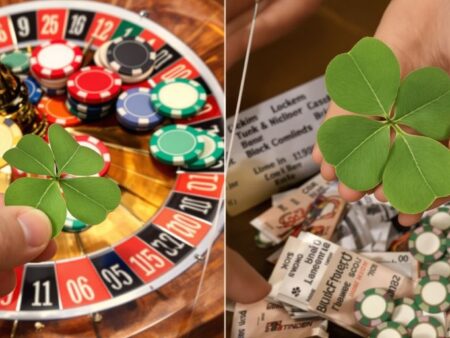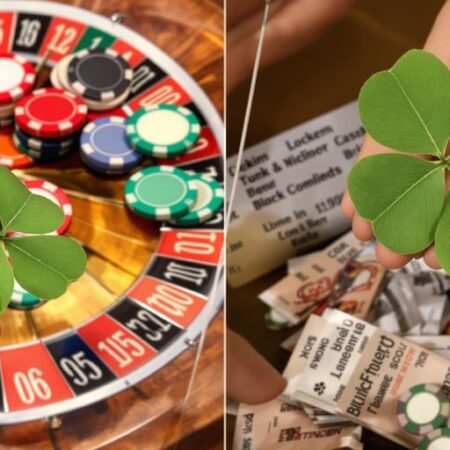Getting into sports betting can be pretty exciting, but it’s easy to get caught up in the moment. One of the biggest traps people fall into is trying to win back money they’ve lost, often called ‘chasing losses.’ This usually leads to bigger problems and empties your wallet faster than you can say ‘upset.’ This guide is all about how to avoid chasing losses in sports betting and keep your betting journey on a more even keel, focusing on smart moves rather than emotional reactions.
Key Takeaways
- Understand that chasing losses is an emotional response, not a strategic one, and it almost always leads to bigger financial losses.
- Set a strict budget for your betting and stick to it, never betting more than you can afford to lose.
- Control your emotions; don’t let wins or losses dictate your betting decisions, and always take a break if you feel overwhelmed.
- Develop a clear betting strategy and follow it consistently, avoiding impulsive bets that deviate from your plan.
- Track all your bets to learn from your performance, identify what works, and refine your approach over time.
Understanding the Psychology of Chasing Losses
It’s a tale as old as time in sports betting: you lose a bet, and then you feel this overwhelming urge to jump right back in, maybe even bet more, to get your money back. This is what we call chasing losses, and honestly, it’s a fast track to blowing through your entire bankroll. It’s not about smart strategy; it’s pure emotion talking. When you’re feeling that sting of a loss, your brain isn’t exactly firing on all cylinders. You start making impulsive decisions, like throwing money at a long-shot parlay or increasing your stake on a game you haven’t really researched. This emotional decision-making trap is where most people go wrong. It’s like trying to dig yourself out of a hole by digging faster – you just end up deeper. You’re not thinking about value or probability; you’re just thinking about that sinking feeling in your stomach. It’s a dangerous cycle, and one that’s incredibly hard to break once you’re in it. Remember, every bet should be a calculated risk, not a desperate attempt to undo past mistakes. If you’re looking for a good place to start betting, check out some of the top sports betting sites in Canada.
Recognizing the Urge to Recover Funds
That feeling after a loss? It’s a powerful one. It’s that little voice telling you, “You can fix this with the next bet.” You might start scanning odds frantically, looking for anything that seems like a sure thing, or maybe a high-risk, high-reward bet that could make you whole again in one go. This isn’t about strategy; it’s about a primal need to undo what just happened. It’s easy to get caught up in this, especially if you’re not used to losing. We see it all the time: a few losses in a row, and suddenly, the sensible approach goes out the window.
The Emotional Decision-Making Trap
When you’re emotionally invested, your judgment gets cloudy. A loss can trigger frustration, anger, or even panic. These feelings can override logic, leading you to make bets you wouldn’t normally consider. You might bet on sports you know little about, or drastically increase your wager size without proper consideration. It’s a classic case of letting your heart rule your head, and in betting, that’s a recipe for disaster. You’re not analyzing the game; you’re reacting to a feeling.
Why Impulsive Wagers Lead to Depletion
Impulsive bets are the enemy of a healthy bankroll. They’re often placed without research, driven by a desire for immediate results. Think about it: betting a large chunk of your funds on a hunch or a gut feeling. Even if you win one of these bets, it’s more luck than skill. More often than not, these impulsive wagers are losers, and when they are, they chip away at your capital much faster than calculated bets. This rapid depletion makes it harder to recover and can quickly lead to you being out of the game entirely.
Establishing a Robust Bankroll Management System
Alright, let’s talk about the nuts and bolts of keeping your betting money safe. Without a solid plan for your bankroll, you’re basically just gambling with house money, and not in a good way. Think of your bankroll as the fuel for your betting car; run out of fuel, and you’re stuck. It’s the money you’ve specifically set aside, separate from your rent or grocery money, for placing wagers. This isn’t just some suggestion; it’s the bedrock of not going broke.
Defining Your Betting Budget
First things first, you gotta figure out how much you can actually afford to lose. Seriously, this is non-negotiable. This amount should be money that, if it vanished tomorrow, wouldn’t send you into a panic or make you miss bill payments. It’s a dedicated fund, and treating it as such is the first step to responsible betting. You wouldn’t use your emergency fund for a night out, right? Same idea here. This budget is your starting point, the foundation upon which all your betting decisions will rest. It’s about setting clear boundaries so you can enjoy the process without undue stress. Finding safe online sports betting sites is a good start to keeping your funds secure.
The 1-2% Rule for Wager Sizing
Now, how much do you actually bet on a single game? A common and sensible approach is the 1-2% rule. This means you only risk between 1% and 2% of your total bankroll on any single bet. So, if your bankroll is $1,000, a 1% bet would be $10, and a 2% bet would be $20. This might seem small, but it’s designed to protect you during those inevitable losing streaks. Imagine you have a $1,000 bankroll and you bet $100 on a game and lose. That’s 10% of your bankroll gone in one go! Now imagine you bet $10 and lose. You’ve lost 1% and can still make plenty more bets. It’s a way to manage risk and prevent one bad bet from wiping you out. This disciplined approach helps maintain an orderly stake management.
| Bankroll | 1% Wager | 2% Wager |
|---|---|---|
| $500 | $5 | $10 |
| $1,000 | $10 | $20 |
| $2,500 | $25 | $50 |
| $5,000 | $50 | $100 |
Protecting Your Capital During Losing Streaks
Losing streaks happen. It’s a fact of life in sports betting, just like taxes. The key is not to let them decimate your bankroll. Sticking to your predetermined wager size, like the 1-2% rule, is your best defense. When you’re losing, the urge to increase your bets to win back what you’ve lost is incredibly strong. That’s chasing losses, and it’s a fast track to ruin. By keeping your bet sizes consistent, you ensure that even after a string of bad luck, you still have capital left to make profitable bets when your luck turns. It’s about playing the long game, not trying to get rich quick. This strategy helps you weather the storms and stay in the betting game.
The Importance of Emotional Discipline in Betting
Sports betting can be a real rollercoaster. One minute you’re on top of the world after a big win, the next you’re staring at a loss that stings. It’s easy to get caught up in the emotions of it all, letting excitement or frustration dictate your next move. But here’s the thing: letting your feelings call the shots is a fast track to blowing through your bankroll. True success in this game isn’t just about picking winners; it’s about keeping your head straight, no matter what happens on the field or in your betting account.
Separating Feelings from Financial Decisions
Think about it. When you win, you feel invincible, right? That little voice whispers, "You’re a genius! Bet bigger!" Then, after a loss, panic sets in. You feel this overwhelming urge to immediately bet again, maybe on something you haven’t even researched, just to get that money back. This is where the trouble starts. Your betting money is just that – money. It shouldn’t be tied to your ego or your mood. You need to create a clear line between how you feel and the actual financial decisions you make. It’s like having a separate wallet just for betting; it helps you see the money for what it is, not as a reflection of your current emotional state. This separation is key to making smart choices consistently.
Maintaining Composure After Wins and Losses
Winning feels great, no doubt. But getting too high on a win can be just as dangerous as getting too low on a loss. Overconfidence can lead you to ignore your strategy or increase your stakes without proper consideration. On the flip side, a string of losses can make you feel like you’re cursed, leading to desperate, impulsive bets. The goal is to achieve a state of calm neutrality. Whether you just won big or lost a few in a row, your approach should remain the same. Stick to your plan. Analyze your bets objectively. Don’t let a winning streak make you reckless, and don’t let a losing streak make you quit or chase losses. It’s a marathon, not a sprint, and staying steady is how you finish. You can find some great resources on managing your betting budget to help with this process here.
Setting Limits to Prevent Emotional Overreach
This is where practical steps come in. You need to set hard limits for yourself, and then, crucially, stick to them. This isn’t just about your bankroll; it’s about your mental state too. Maybe you decide that after three consecutive losses, you’re done for the day, no matter what. Or perhaps you set a rule that you won’t place a bet within an hour of finishing a game you were emotionally invested in. These kinds of boundaries act as circuit breakers for your emotions. They give you a chance to cool down and reassess before making a decision you’ll regret. It’s about building in pauses, moments to breathe and think rationally. Without these self-imposed rules, it’s far too easy to get swept away by the heat of the moment, leading to decisions that are driven by impulse rather than logic. Remember, discipline isn’t about never feeling emotion; it’s about not letting those emotions control your actions.
Developing a Consistent Betting Strategy
Look, sports betting isn’t just about picking winners. It’s about having a plan, a real strategy that you actually stick to. Without one, you’re basically just throwing money around and hoping for the best. That’s not a strategy, that’s a recipe for disaster. You need something solid, something you can rely on when things get tough, because trust me, they will get tough.
Sticking to Your Pre-Defined Plan
This is where the rubber meets the road. You’ve done your research, you’ve figured out what kind of bets make sense for you, and you’ve set some rules. Now, you gotta follow them. It sounds simple, but it’s surprisingly hard. When you’re on a hot streak, the temptation to go off-script and bet bigger or on something you haven’t researched is huge. Likewise, after a few losses, you might feel the urge to chase those losses with desperate, ill-advised bets. A solid plan acts as your anchor. It keeps you grounded and focused on the long game, not just the next bet. Think of it like this:
| Scenario | Action Based on Plan | Potential Outcome Without Plan |
|---|---|---|
| Losing Streak | Stick to unit size | Increase bet size to chase loss |
| Winning Streak | Stick to unit size | Increase bet size recklessly |
| Unexpected News | Analyze, then bet | Bet impulsively on the news |
Avoiding Rash Decisions Driven by Emotion
Emotions are the enemy of a good betting strategy. Excitement after a win can lead to overconfidence, making you think you’re invincible. Frustration after a loss can lead to anger, pushing you to make impulsive bets to
The Power of Tracking Your Betting Performance
Look, nobody likes losing money. It stinks. But if you’re serious about sports betting, you absolutely have to get a handle on your performance. It’s not enough to just place bets and hope for the best. You need to know what’s working and, more importantly, what isn’t. This is where tracking your bets becomes your best friend. It’s like having a personal coach, but instead of yelling at you, it just shows you the cold, hard facts.
Logging Every Wager for Analysis
Seriously, write down everything. Every single bet you make. What sport was it? Who was playing? What kind of bet was it? How much did you put down? What were the odds? Did the line move before the game started? And, of course, what was the outcome? Some betting platforms might keep a history, but it’s often not enough. You need your own system, maybe a simple spreadsheet or a dedicated app. This detailed record-keeping isn’t just busywork; it forces you to be more deliberate with your betting and builds a solid foundation for understanding your results. It’s a habit that separates the serious players from the casual ones.
Identifying Strengths and Weaknesses
Once you’ve got a decent amount of data, you can start digging in. This is where the real insights come from. Are you killing it on NFL moneylines but losing money on NBA over/unders? Maybe you do well with parlays but struggle with live betting. You can slice your data in so many ways: by sport, by bet type, by the amount you wagered, even by the odds you were getting. Finding these patterns is key to figuring out where to focus your energy and where you need to improve. It’s not about feeling good; it’s about getting better.
Here’s a quick look at how you might break down your performance:
- Sport: Football, Basketball, Baseball, Hockey, etc.
- Bet Type: Moneyline, Spread, Total, Prop Bet, Parlay, Teaser
- Wager Size: 1 unit, 2 units, 5 units, etc.
- Odds Range: Even money (+100), Favorites (-200), Underdogs (+150)
- Outcome: Win, Loss, Push
Using Data to Refine Your Strategy
This is the payoff. You’ve logged your bets, you’ve analyzed your performance, and now you know what’s up. Maybe you realize you’re too aggressive with your unit sizing on certain bet types, or perhaps you’re consistently finding value in a specific market. Use this information to adjust. Maybe you need to bet smaller amounts on games you’re less confident about, or perhaps you should dedicate more time to researching a sport where you’ve shown a profit. It’s a continuous cycle: track, analyze, adjust, and repeat. This data-driven approach is what turns a hobby into something potentially profitable over the long haul. Don’t just bet; bet smarter.
Setting Realistic Expectations for Profitability
Viewing Betting as a Marathon, Not a Sprint
Look, nobody gets into sports betting thinking they’re going to lose money. We all start with dreams of hitting it big, right? But let’s get real for a second. Trying to turn a hundred bucks into a thousand overnight is a recipe for disaster. It’s like trying to sprint a marathon; you’re going to burn out fast. You gotta shift your mindset. Think long-term, steady wins. It’s about building your bankroll slowly and surely, not about one massive score. This approach helps you avoid those panic bets when things go south.
Accepting Losing Streaks as Part of the Process
So, you lost a few bets in a row. Big deal. It happens to everyone, even the pros. If you can’t handle a few losses, you’re in the wrong game. These losing streaks are just part of the journey. Instead of getting all bent out of shape and chasing your losses, you need to accept them. Analyze what went wrong, sure, but don’t let it derail your entire strategy. The key is to not let emotions dictate your betting decisions. It’s tough, I know. I’ve been there, staring at my screen, wanting to just throw more money at the problem. But that’s exactly what you shouldn’t do. Stick to your plan, even when it feels like the world is against you.
Focusing on Gradual, Sustainable Growth
This is where the real money is made, folks. Forget the get-rich-quick schemes. We’re talking about consistent, incremental gains. It’s about making smart bets, managing your money well, and slowly but surely growing your bankroll. Think of it like investing in the stock market; you don’t expect to double your money in a week. You look for steady returns over time. This applies directly to sports betting too. By focusing on gradual growth, you protect your capital and set yourself up for long-term success. It’s a much more enjoyable way to bet, honestly. You can find some great tips on how to manage your funds on mobile betting apps.
Mastering Value Betting for Long-Term Gains
Finding value in sports betting is like being a detective, but instead of solving crimes, you’re uncovering discrepancies in odds. It’s not just about picking winners; it’s about finding bets where the odds offered don’t accurately reflect the true probability of an event happening. This is where the real money is made over the long haul. Think of it this way: if a sportsbook is offering odds that suggest a 30% chance of something happening, but you’ve done your homework and believe it’s actually a 40% chance, that’s a value bet. You’re getting more bang for your buck, so to speak.
Identifying Discrepancies in Odds
So, how do you spot these golden opportunities? It starts with understanding how odds translate into implied probabilities. For example, American odds of +200 mean there’s roughly a 33.3% implied probability of that outcome occurring. If your own analysis suggests the actual probability is higher, you’ve found value. It’s a simple concept, but executing it consistently requires diligence. You’re looking for those moments when the market, for whatever reason, gets it wrong. Maybe it’s a new injury, a change in weather, or just a general misunderstanding of a team’s form. Whatever the cause, your job is to find it.
Comparing Odds Across Multiple Sportsbooks
This is non-negotiable. Different sportsbooks will have different odds for the same event. It’s like shopping around for the best price on anything else. You wouldn’t buy a TV without checking a few stores, right? The same applies here. A half-point difference in a point spread or a few cents on the moneyline might not seem like much, but over hundreds or thousands of bets, these small edges compound significantly. It’s about maximizing your return on every single wager. You need to be signed up with several reputable sportsbooks to ensure you’re always getting the best possible price. Don’t leave money on the table; it’s just bad business.
Capitalizing on Probabilistic Edges
Once you’ve identified a value bet, the next step is to act on it. This means placing your wager with confidence, but still within your bankroll management plan. Remember, even a value bet isn’t a guaranteed win. It’s a bet where, over the long run, you expect to profit because you’re consistently getting favorable odds. It’s about playing the probabilities. You’re not trying to predict the future perfectly; you’re trying to make smart bets based on the information you have. This disciplined approach to capitalizing on these edges is what separates profitable bettors from the rest. It’s a marathon, not a sprint, and consistent application of this principle is key.
The Pitfalls of Overconfidence After Success
Winning streaks feel great, right? You start to think you’ve cracked the code, that you’re some kind of sports betting guru. This is where overconfidence creeps in, and it’s a sneaky beast. Suddenly, those sensible bet sizes you were sticking to seem too small. You feel invincible, like every pick is a sure thing. This inflated sense of certainty is incredibly dangerous. It’s easy to forget that luck plays a part, and past successes are no guarantee of future results. You might start ignoring your strategy, thinking you know better than the numbers. It’s a slippery slope from feeling good to making reckless decisions that can wipe out your hard-earned gains faster than you can say ‘upset victory’.
Why Past Wins Don’t Guarantee Future Results
Remember that time you nailed five straight parlays? Awesome. But does that mean your next five will be winners too? Nope. Sports are unpredictable. A team that dominated last week might stumble this week. A player who was on fire could have an off night. Relying on past performance as a crystal ball is a recipe for disaster. You need to treat each bet as a fresh analysis, not a continuation of a winning streak. It’s about the current odds, the current matchups, and your current strategy, not about what happened last Tuesday.
Resisting the Temptation to Increase Stakes Recklessly
When you’re on a roll, the urge to bet bigger is almost overwhelming. It feels like free money, doesn’t it? But this is precisely when you need to be the most disciplined. If your bankroll management plan says bet $10 on a game, stick to $10, even if you just won $100. Increasing your stake size just because you’re winning is a form of chasing profits, which is just as bad as chasing losses. It’s about sustainable growth, not a quick lottery win. Keep those bet sizes consistent, no matter how good you feel about a particular pick. You can always adjust your unit size later if your overall bankroll grows significantly, but do it based on your plan, not your ego. Check out some tips on finding fast withdrawal betting sites to ensure you can access your winnings efficiently.
Maintaining a Disciplined Approach Even When Winning
Discipline isn’t just for when you’re losing; it’s arguably even more important when you’re winning. It’s easy to get complacent. You might start skipping the research, thinking you can just wing it. Don’t do that. Keep following your strategy, keep analyzing the data, and keep your emotions in check. Winning can be just as much of a mental trap as losing. It’s about consistency. Think of it like this:
- Review your strategy: Did it work because of skill or luck?
- Stick to your unit size: Don’t let wins inflate your bet amounts.
- Stay objective: Don’t let confidence cloud your judgment.
- Keep learning: Every game is a new opportunity to gather information.
Leveraging Knowledge of Familiar Sports
It’s easy to get excited about all the different sports you can bet on. There are so many leagues, so many players, so many stats to look at. But honestly, trying to learn everything about every sport all at once? It’s a recipe for disaster and a quick way to burn through your bankroll. Stick with what you know. Seriously. If you’re a basketball fanatic, focus on the NBA. If you live and breathe football, concentrate on the NFL or college ball. Trying to bet on obscure European handball leagues when you barely know the rules is just asking for trouble.
Deep Diving into Sports You Understand
When you actually know a sport, you understand the nuances. You know which players are clutch and which ones tend to choke under pressure. You know how coaching schemes can change a game. You can spot when a team is undervalued because the public is overreacting to a single bad performance. This kind of insight is gold. It’s not just about looking at stats; it’s about understanding the context behind them. For example, in baseball, knowing a pitcher’s history against a specific lineup or understanding how a hitter performs against left-handed pitching gives you an edge that a casual observer just won’t have. It’s like the difference between reading a book review and actually reading the book yourself.
Avoiding Overwhelm with New Markets
Let’s be real, the sheer volume of betting markets can be intimidating. You’ve got point spreads, money lines, totals, player props, futures, parlays… the list goes on. If you’re trying to learn all of this for a sport you’re unfamiliar with, it’s going to be a mess. You’ll be guessing more than analyzing. Start with the basics in a sport you’re comfortable with. Master the moneyline and the point spread first. Once you’re consistently profitable and understand those markets inside and out, then maybe, just maybe, you can start exploring other options. But don’t rush it. Patience is key here.
Building Expertise Before Branching Out
Think of it like this: you wouldn’t try to become a brain surgeon the day after deciding you want to go into medicine, right? You start with the basics, build a foundation, and then specialize. Sports betting is no different. Become an expert in one or two sports. Know the teams, the players, the coaches, the historical trends, and even the betting market dynamics for those sports. Once you’ve built that solid base of knowledge and proven success, then you can gradually expand your betting horizons. This methodical approach prevents costly mistakes and builds confidence as you see your profits grow steadily.
Strategic Approaches to Live Betting
Live betting, also known as in-play betting, is where the real excitement happens for many sports fans. It’s like being in the middle of the action, placing bets as the game unfolds. This dynamic environment offers unique opportunities, but you’ve got to be smart about it. It’s not just about guessing; it’s about reacting to the game’s flow.
Managing Bankroll During In-Play Wagers
This is super important. When you’re betting live, the odds change fast, and it’s easy to get carried away. You need a clear plan for how much you’re willing to bet. Think of it like this: if you have $100 for live betting, maybe you only put $5 or $10 on any single bet. This stops you from blowing through your money too quickly if a few bets don’t go your way. Sticking to a strict budget prevents you from chasing losses. It’s a discipline thing, really.
Capitalizing on Momentum Shifts
Games aren’t static; they have ups and downs. Momentum shifts are those moments when one team or player starts dominating. Maybe a team just scored, or a player is on a hot streak. Betting on the team that’s currently playing well, especially if the odds haven’t fully caught up yet, can be a smart move. You’re essentially betting on the current flow of the game. It’s about spotting those turning points before everyone else does.
Diversifying Live Betting Markets
Don’t just stick to betting on who wins the game. Live betting opens up tons of other options. Think about things like:
- Next team to score
- Total number of corners or fouls
- Player performance props (like total points or assists)
- The outcome of the next play
Spreading your bets across different markets can help reduce risk. If one type of bet doesn’t work out, another might. It’s like not putting all your eggs in one basket, you know?
Wrapping It Up: Your Path to Smarter Betting
So, we’ve gone over a lot of stuff about sports betting. The big takeaway here is that it’s not about hitting home runs every time. It’s more like a marathon, you know? You gotta manage your money wisely, don’t get too caught up in trying to win back what you lost on the last bet – that’s a fast track to trouble. Keep track of your bets, stick to what you know, and try not to let your emotions run the show. If you do that, you’ll probably have a better time and maybe even make some money over the long haul. It takes practice, but focusing on these basics is your best bet for staying in the game.
Frequently Asked Questions
What’s the best way to manage my betting money?
Think of your betting money like a separate piggy bank. Don’t mix it with your rent or grocery money. This helps you make smart choices and stops you from trying to win back lost money with cash you need for other things. It’s the first step to betting safely.
How much should I bet each time?
Usually, you bet a small part of your total money, like 1% to 5%. If you have $100 for betting, you’d bet $1 to $5 per game. This way, if you have a bad streak, you don’t lose all your money too quickly.
Can I really make money betting on sports?
Yes, it’s possible to make money over time, but it’s not easy or fast. You have to be smart with your choices, manage your money well, and be patient. Most people who win consistently treat it like a long-term plan, not a get-rich-quick scheme.
What should I do if I lose a bet?
It’s super tempting to bet more after you lose, trying to win it all back fast. But this usually makes you lose even more. Instead, stick to your plan, don’t bet when you’re upset, and walk away if you hit your losing limit for the day.
What happens if I start winning a lot?
When you win a few bets in a row, it’s easy to feel like you can’t lose. But past wins don’t guarantee future wins. Keep betting the same amount you planned, and don’t get too excited and bet way more than you should.
Should I bet on sports I don’t know much about?
Betting on sports you actually understand makes things much simpler. Learning about new sports, players, and stats can be a lot to handle. Get really good at the sports you already know before you try betting on new ones.
Why is it important to track my bets?
Keeping track of every bet you make is really important. It helps you see what’s working and what’s not. You can use a simple notebook or a spreadsheet. This information helps you get smarter with your bets over time.
What are realistic goals for sports betting?
Don’t expect to get rich overnight. Think of sports betting like a long race, not a short sprint. Set small goals for yourself and celebrate small wins. Accepting that you’ll have some losing days is part of the process to growing your money slowly and surely.
















